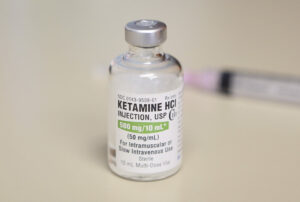In recent years, ketamine therapy has emerged as a promising treatment for alcoholism. Ketamine is a synthetic drug that has been shown to help alcoholics overcome cravings, reduce drinking behaviors, and improve overall mental health. In this blog post, we will explore the ketamine therapy process and why it may be the best option for alcoholism patients. We will also discuss some potential side effects and how you can get the most out of this treatment.
Contents
What is Ketamine?

Ketamine, also known as “Special K,” is a dissociative anesthetic and analgesic that has been used in medicine since the 1960s. It was initially developed as an anesthetic for humans but has since been found to be useful in treating a variety of medical conditions, including depression, addiction to opioids, and trauma. Ketamine is currently being explored as a treatment for alcoholism.
One study found that ketamine improved alcohol withdrawal symptoms in patients who were not responding to other treatments. In another study, ketamine was shown to be more effective than a placebo in reducing urges to drink and drinking behaviors in alcohol-dependent patients. The most significant side effects of ketamine therapy are generally mild and include euphoria, hallucinations, and increased feelings of excitement and well-being.
How Does Ketamine Therapy For Alcoholism Work?
Ketamine is an anesthetic and general analgesic that has been used in humans since the 1960s. It is currently being studied as a potential treatment for alcoholism, as it can reduce cravings and withdrawal symptoms.
Ketamine works by reducing the activity of certain neurotransmitters in the brain, including glutamate and GABA. These neurotransmitters play a role in regulating mood and behavior. When ketamine blocks these neurotransmitters, it reduces cravings and withdrawal symptoms. Additionally, ketamine appears to improve cognitive function, which may help people overcome addiction.
The working of ketamine therapy for alcoholism is still under study, and there is currently no cure for alcoholism. However, ketamine appears to be a promising treatment option that may help people overcome their addiction. It also has a low risk of addiction, making it an attractive option for those who have failed to respond to other treatments.
Benefits of Ketamine Therapy For Alcoholism

There are many benefits to using ketamine therapy for alcoholism. Some of these are:
Quick Response
One of the most significant benefits of ketamine therapy is that it works quickly. Ketamine can reduce cravings and withdrawal symptoms almost immediately, which makes it a more attractive option for those who are struggling to stay sober.
Low Risk of Addiction
Ketamine has a much lower risk of addiction than other drugs used to treat alcoholism. This makes it an ideal option for those who are looking to end their addiction without developing a new dependency.
Improved Cognitive Function
Ketamine has been shown to improve cognitive function, which may help people overcome addiction by boosting self-control and decision-making abilities. This can be beneficial in assisting people to stay away from alcohol and use other coping mechanisms instead.
Side Effects of Ketamine Therapy For Alcoholism
Side effects of ketamine therapy for alcoholism can depend on a variety of factors, such as prior drug abuse history and the dosage administered.
The most common side effects of ketamine therapy include :
Sedation
Sedation is the most common side effect of ketamine therapy. It occurs when the patient feels sleepy or disoriented from the anesthetic effects of the drug.
Dissociation
Dissociation is a feeling of disconnection from reality and can occur after taking ketamine. Common symptoms include hallucinations, distorted sense of time, altered perceptions, and out-of-body experiences.
Nausea
Many patients experience nausea and vomiting after taking ketamine. The anesthetic effects of the drug often cause this.
Increased Heart Rate and Blood Pressure
Ketamine can cause a rapid increase in heart rate, breathing rate, and blood pressure. Patients should be monitored for any increases in these vital signs. This also makes it important to discuss any existing medical conditions with the doctor before starting ketamine therapy.
Tips For Getting the Most Out Of Ketamine Therapy
Ketamine therapy for alcoholism can be an effective treatment option if managed correctly. Here are some tips to get the most out of this form of treatment:
- Talk to your doctor about all possible side effects and risks before beginning ketamine therapy. One should also discuss their expectations for the treatment.
- Check in with your doctor regularly throughout treatment to monitor any side effects or changes in symptoms.
- Be honest and open with your doctor about any drug use or drinking behaviors. This will help ensure that you are getting the best possible care.
- Practice relaxation techniques like mindfulness and deep breathing to help manage cravings and withdrawal symptoms.
- Follow up with your doctor even after treatment has ended to discuss any potential relapse prevention strategies.
- Try to establish a healthy lifestyle, including regular exercise and a balanced diet. Ketamine therapy for alcoholism is an experimental treatment that may be able to help people overcome their addiction.
How to Obtain Ketamine Therapy For Alcoholism?

If you are looking to obtain ketamine therapy for alcoholism, there are a few things that you will need to do to set up an appointment.
First, you will need to find a clinic that specializes in ketamine therapy. Many clinics offer free consultation appointments so that you can determine if this is the treatment option for you. There may be many clinics in your area so it is important to do some research and find the best fit for you.
Once you have found a clinic that meets your needs, make sure that they are properly licensed and insured. You will also need to provide them with information about your medical history, alcohol use history, and any medications that you may be taking.
Once you have found a clinic, the next step is to make an appointment. It is important to note that ketamine therapy is not always effective for treating alcoholism, and requires regular treatment sessions to be effective. Make sure to schedule a time that works best for you and your therapist, as well as your other commitments.
After you have had your consultation appointment and decided that ketamine therapy is the right treatment option for you, make sure to follow all the instructions provided by your doctor to ensure a safe and successful treatment.
Finally, be prepared to pay for the services offered by the clinic. This may include fees for the initial consultation appointment, as well as monthly or quarterly treatment sessions. Remember, though, that most clinics offer financial assistance options so that everyone can afford the treatments they need.
Conclusion
Alcoholism is a serious problem that affects millions of people around the world. If you or someone you love is struggling with alcoholism, it’s important to seek out professional help. However, some alternative treatments may be effective too. One such treatment is ketamine therapy. Ketamine is an effective treatment for alcoholism in clinical trials and can provide some relief from the symptoms of alcohol addiction. If you are interested in trying ketamine as an option for treating your alcoholism, consult MantraCare about what options are available to you.
After you have had your consultation appointment and decided that ketamine therapy is the right treatment option for you, make sure to follow all the instructions provided by your doctor to ensure a safe and successful treatment.
For more information, please contact MantraCare. Addiction is a chronic and often relapsing disorder characterized by compulsive drug-seeking and use despite harmful consequences. If you have any queries regarding Online Addiction Counseling experienced therapists at MantraCare can help: Book a trial Online therapy session


